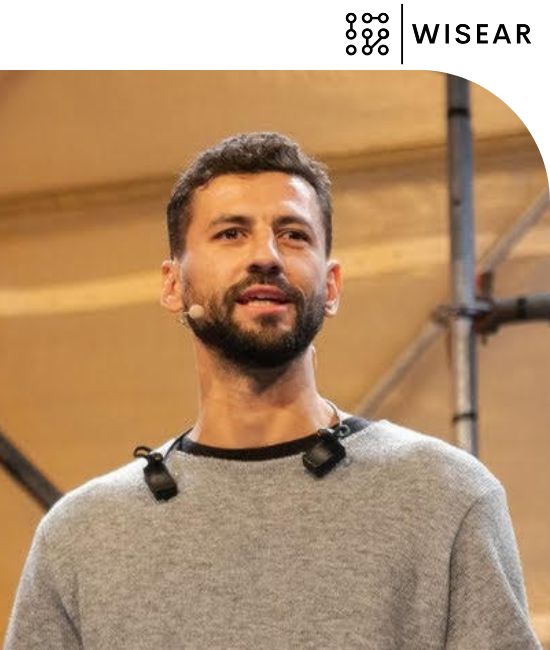10:35 - 11:00
Description
Join Yacine Achiakh, Founder of Wisear, as he delves into the crucial role of neural interfaces in driving the widespread adoption of augmented reality (AR) and demo their benefit live on stage. In this captivating keynote, Yacine will explore the evolution of human-computer interfaces, from keyboards and mice to touchscreens, and highlight the need for a new generation of interfaces to propel AR into the mainstream. Discover how current controllers fall short in delivering seamless and immersive interactions, and why alternatives like voice and hand tracking have their limitations.
Yacine will unveil the game-changing potential of neural interfaces, which enable touchless and voiceless control through facial muscular, eye, and brain activity. Witness live how Wisear is at the forefront of building neural-interface powered products that revolutionize the way we interact with AR and VR devices, paving the road for ubiquitous adoption in consumer and enterprise applications. Don't miss this enlightening presentation that will shape the future of human-computer interactions in XR.
Speakers

11:05 - 11:30
Description
Through real-world case studies from various industries, witness the remarkable achievements of organizations that have successfully decreased implementation time by 40% or more, while consistently achieving right-first-time results. Gain valuable insights into the transformative power of XR technology and its potential to revolutionize the manufacturing landscape.
Join us in this engaging session as we delve into the future of implementation practices, harnessing the potential of XR technology and new methodologies to drive unprecedented speed and success in the implementation of production lines and automation projects. Prepare to be inspired and equipped with practical strategies to enhance your organization's efficiency and ensure the seamless execution of your next implementation endeavor.
Speakers


12:30 - 12:55
Description
Dispelix develops and delivers lightweight, high-performance see-through waveguide combiners that are used as transparent displays in extended reality (XR) devices. Our full-color near-eye displays encompass all dimensions of XR comfort - social, wearable, and visual alike – in a simple eyeglass-lens form. Rich and pleasant XR experience calls for seamless merger of display and light engine technologies. In her presentation, Dispelix Vice President Pia Harju discusses how advanced design contributes to XR comfort and same time helps draw full potential from the light engine and display. We will showcase how built-in mechanical and optical compatibility fuse esthetic and functional aspects of design, paving the way for mind-altering XR eyewear experience.
Speakers

13:00 - 13:25
Description
Testing optical performance of components and the image quality of a completed XR headset is an important but not well-known part of the product development and mass production cycle - in fact, today's headsets would likely not be existing without it.
In this presentation, we will give an overview of the various steps in the production process where optical testing comes into play and discuss new developments like active alignment technology where we make use of real-time test data to assemble XR modules for best image quality.
Finally, we describe a new generation of test equipment that uses custom high-end optics specially tailored to XR that integrates both "big" and "small" picture-scale image quality test capabilities in one instrument, bringing test technology to the next level to support tomorrow's high-resolution XR headsets.
Speakers

13:30 - 13:55
Description
Solving the vergence-accommodation conflict – the mismatch between perceived and focal distances for stereoscopic 3D displays – represents a critical hurdle to overcome for augmented reality (AR). Overcoming this would smooth interactions with virtual content, blurring the line between the simulated and the real, yet the industry has yet to settle on an approach.
In this presentation, IDTechEx outlines the range of display and optical systems proposed to solve the vergence-accommodation conflict, weighing up technological suitability and market forces to suggest likely candidates for wide deployment. Technologies including retinal projection, holographic and light field displays, and focus-tunable lenses are detailed and benchmarked on promotion of social acceptability, manufacturing feasibility and other factors. Alongside assessment of industry forces, this leads to the presentation of adoption roadmaps, plotting a path for integration into immersive consumer AR devices.
Speakers

14:00 - 14:25
Description
The ability to effectively and efficiently interact with and understand indoor spaces creates opportunities and significantly benefits industries that rely on indoor navigation, such as retail, hospitality and healthcare. Aryve is an advanced solution from svarmony that provides users with an innovative approach to the challenges of indoor navigation. Unlike traditional navigation methods such as GPS, aryve integrates state-of-the-art Visual Positioning Systems (VPS) that enable precise indoor positioning and orientation.
In his presentation, Sascha Kiener, CEO of svarmony, will go into detail about the critical technology behind aryve and the opportunities it creates to bring about change in various industries. By seamlessly connecting the physical and digital worlds, aryve offers a new “navigation experience.” From assisting visitors in large shopping malls to improving patient navigation in complex hospital structures, the tool demonstrates a wide range of applications.
As adoption of the technology increases, companies have the opportunity to differentiate themselves from their competitors by providing AR in-vehicle navigation. In addition, new revenue streams can emerge through partnerships, data monetization and personalized advertising.
The presentation highlights the potential of aryve and what benefits it provides to those who adopt the technology. Through the use of VPS systems and augmented reality, indoor navigation is on the verge of a significant redesign that promises improved user experiences and new business opportunities across various industries.
Speakers

14:30 - 14:55
Description
Web browsing through XR enables users to navigate and interact with traditional web-based content as well as immersive Web XR experiences. This session will explore the technical challenges and design opportunities of creating a Web browser designed specifically for XR devices.
Join us as we discuss the building of Wolvic, a multiplatform and open source Web browser for XR. Attendees are encouraged to engage in the presentation, ask questions, and join the project of this web browsing project for XR.
Speakers

15:30 - 16:00
Description
The productivity metaverse is in the trough of Gartner’s hype cycle and that means it is actually taking off. All around the globe, industries and governments are eagerly pushing and realizing the first benefits of projects leveraging XR. We will share some joint research conducted by Ernst and Young jointly with Nokia that highlights concrete commercial and productivity impacts of XR today. And then – because we are dreamers and innovators– we’ll provide some insights on the road to 6G. What can 6G bring that is already in planning, and how can the XR community ensure 6G addresses its needs and hopes and by the same token take full advantage of the power of a sensing network?
Speakers


16:05 - 16:30
Description
The first full time adopters of AR glasses will be people that are already wearing eyewear on a daily basis. Virtually everyone in this category requires prescription lenses.
In order to allow personalized, prescription AR glasses, mass customization of optics is key. However, this is only part of the picture. This talk will focus on the supply chain that is needed to allow personalized AR glasses for the masses.
There is a lot to learn from an existing supply chain that allows the personalized prescription eyewear that consumers currently have access to. The eyewear industry has solved the problem of delivering personalized glasses by separating the end product into two components; the frame and the lenses.
In the future, AR glasses will be designed in a comparable way to current eyewear; consisting of a smart frame, and smart lenses, containing the display technology.
During this talk we will take a deeper look into the AR ecosystem, and how the development of smart lenses (with integrated light engines) will allow the industry to enable a supply chain that has many parallels with the current eyewear industry.
Specifically, we will focus on how current players in the AR ecosystem will collaborate in the future. Which players will enable smart frames? Which industries will enable the smart lenses, and how? How does software play a role in this?
Speakers

16:35 - 17:00
Description
Join us as we explore how WebGPU makes high-quality graphics accessible to all, eliminating the need for separate app installations on user devices. As an evolution of WebGL, WebGPU offers enhanced XR capabilities, enabling developers to create immersive and visually stunning WebXR experiences. Moreover, you'll have the opportunity to witness a live demonstration showcasing the real-time capabilities of both WebGPU and WebGL on a captivating real-world project.
Speakers

17:05 - 17:30
Description
This talk delves into the immersive world of Augmented Reality (AR) content creation and its profound impact on spatial storytelling across diverse industries. We will discuss the untapped potential of AR experiences and discuss using intuitive tools and generative AI to craft captivating AR experiences.
The talk begins with exploring why spatial storytelling matters and how it revolutionises how we engage with the world around us. Attendees will gain insights into the unique power of AR to seamlessly blend digital elements into the real world, creating interactive and emotionally resonant narratives that transcend traditional media formats.
We will delve into the practical aspects of AR content creation. Attendees will learn to harness essential creative tools and user-friendly authoring tools empowering them to build immersive AR experiences with ease. The integration of generative AI tools will be showcased, demonstrating how AI-driven content creation enhances storytelling possibilities and audience engagement.
Spatial storytelling can be leveraged to create next-generation entertainment, interactive educational experiences, and enhanced customer interactions, making it an indispensable tool for anyone seeking to stand out in a competitive market.
Speakers


17:35 - 18:00
Description
This talk will provide an overview of existing Web3 technologies and the ground reality of their capabilities in supporting XR applications. Web3, powered by blockchain technology, is evolving rapidly, and numerous upcoming features benefit Augmented and Virtual Reality use cases. It is resourceful for the XR developers and the enterprise to be aware of the developments in the Web3 space and explore synergies with decentralized protocols.
Speakers
